This article has an unclear citation style .(April 2024) |
Book peddlers were travelling vendors ("peddlers") of books. This occupation had its peculiarities in various countries.
This article has an unclear citation style .(April 2024) |
Book peddlers were travelling vendors ("peddlers") of books. This occupation had its peculiarities in various countries.
In the country with no single "state-sponsored" religious denomination, travelling evangelists played an important role. [1] Selling pamphlets and books, especially the Bible , were often an additional source of income of travelling preachers. Among the best organized booksellers were the American Bible Society and the American Tract Society, which had significant forces of colporteurs . "Evangelical preachers pioneered many techniques that salespeople would later adopt." [1]
Door-to-door book peddlers of the 18th and 19th centuries, also known as "book canvassers", used to carry special "sample books", a kind of "preview", with a table of contents, sample illustrations and some text, designed to advertise the book in question. [2] Canvassing subscription sales were the only way to deliver books to many rural areas of America. [2]
Hawkers (peddlers) were often frowned upon by the law, but book peddlers were treated differently. For example, Massachusetts and Missouri excepted book peddlers from laws imposing penalties on unlicensed hawkers. [3]
When printing Lithuanian language books in Latin alphabet was forbidden in Russian Empire, book peddlers, knygnešiai in Lithuanian, smuggled the books printed abroad, in Lithuania Minor, under the threat of criminal prosecution. This activity played an important role in preservation of the Lithuanian culture, and in modern Lithuania knygnešiai are commemorated in museums, monuments, street names, and their remembrance day.
In 1866, the "Society for Distribution of the Holy Scripture in Russia" (“Высочайше утверждённое Общество для распространения Священного Писания в России”) was established in St. Petersburg, with subsidiaries in Moscow established in early 1880s. [4] In addition to the initial goal of peddling the Christian literature, they started to arrange religious discussion meetings. Eventually the activities of the society were frowned upon by the administration of the Russian Church for their independence and liberalism and closeness to the Tolstoyans. After various restrictions put forth by the infamous Ober-Procurator of the Holy Synod Konstantin Pobedonostsev, the activity of the society dwindled.
The Seventh-day Adventists, persecuted in Russia, employed colportage of literature published abroad and smuggled into Russia, under the threat of arrest, fine, and confiscation. [5]
The tradition of book peddling traces back to the Edo period. Taro Aso, Minister for Foreign Affairs of Japan, in his speech in the Japan Institute of International Affairs (2006) describes them as follows.
If you look for example at the book lenders of the day, it seems that a single book lender would have over a hundred customers. When a new title was released, the book lenders would put it into a bag and take it round to their customers. The customers would then slice open the seal on the bag to get the latest release. This, incidentally, is where the word for "the latest release", fukiri — literally "seal-slicing" — has its origins, and we still use that word to this day, although in recent years to describe the release of new movies. [6]

Mendele Mocher Sforim, born Sholem Yankev Abramovich or S. J. Abramowitch, was a Jewish author and one of the founders of modern Yiddish and Hebrew literature. His name was variously transliterated as Moykher, Sfarim,Seforim, etc.

A hawker is a vendor of merchandise that can be easily transported; the term is roughly synonymous with costermonger or peddler. In most places where the term is used, a hawker sells inexpensive goods, handicrafts, or food items. Whether stationary or mobile, hawkers often advertise by loud street cries or chants, and conduct banter with customers, to attract attention and enhance sales.

A peddler, in British English pedlar, also known as a chapman, packman, cheapjack, hawker, higler, huckster, (coster)monger, colporteur or solicitor, is a door-to-door and/or travelling vendor of goods. In 19th-century America the word "drummer" was often used to refer to a peddler or traveling salesman; as exemplified in the popular play Sam'l of Posen; or, The Commercial Drummer by George H. Jessop.
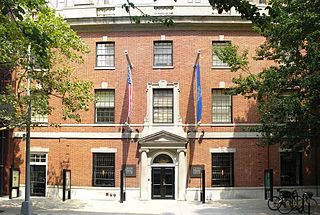
YIVO is an organization that preserves, studies, and teaches the cultural history of Jewish life throughout Eastern Europe, Germany, and Russia as well as orthography, lexicography, and other studies related to Yiddish. Established in 1925 in Wilno in the Second Polish Republic as the Yidisher Visnshaftlekher Institut (ייִדישער װיסנשאַפֿטלעכער אינסטיטוט, pronounced[ˈjidiʃɛrˈvisn.ʃaftlɛχɛrinstiˈtut], Yiddish Scientific Institute.

Tarō Asō is a Japanese politician serving as the Vice President of the Liberal Democratic Party (LDP) since 2021. Asō previously served as Prime Minister of Japan from 2008 to 2009 and as Deputy Prime Minister of Japan and Minister of Finance from 2012 to 2021. He was the longest-serving Deputy Prime Minister and Minister of Finance in Japanese history, having previously served as Minister for Foreign Affairs from 2005 to 2007 and as Minister for Internal Affairs and Communications from 2003 to 2005. He leads the Shikōkai faction within the LDP.
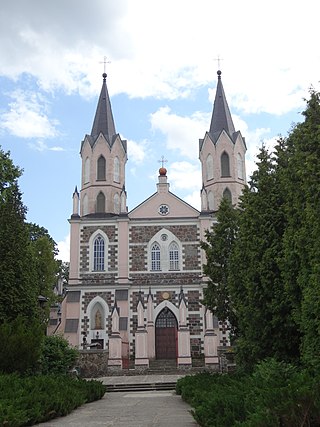
Puńsk is a village in the Podlaskie Voivodeship in northeastern Poland, seat of the Gmina Puńsk in the Sejny County. It is located only 5 km (3.1 mi) from the border with Lithuania.
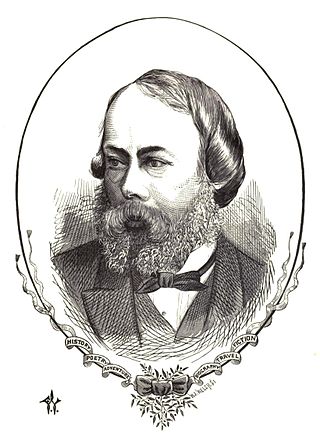
Charles Edward Mudie , English publisher and founder of Mudie's Lending Library and Mudie's Subscription Library, was the son of a second-hand bookseller and newsagent. Mudie's efficient distribution system and vast supply of texts revolutionized the circulating library movement, while his "select" library influenced Victorian middle-class values and the structure of the three-volume novel. He was also the first publisher of James Russell Lowell's poems in England, and of Emerson's Man Thinking.

Lithuanian book smugglers or Lithuanian book carriers smuggled Lithuanian language books printed in the Latin alphabet into Lithuanian-speaking areas of the Russian Empire, defying a ban on such materials in force from 1864 to 1904. In Lithuanian knygnešys literally means "the one who carries books". Opposing imperial Russian authorities' efforts to replace the traditional Latin orthography with Cyrillic, and transporting printed matter from as far away as the United States to do so, the book smugglers became a symbol of Lithuanians' resistance to Russification.

Colportage is the distribution of publications, books, and religious tracts by carriers called "colporteurs" or "colporters". The term does not necessarily refer to religious book peddling.

The Lithuanian press ban was a ban on all Lithuanian language publications printed in the Latin alphabet in force from 1865 to 1904 within the Russian Empire, which controlled Lithuania proper at the time. Lithuanian-language publications that used Cyrillic were allowed and even encouraged.
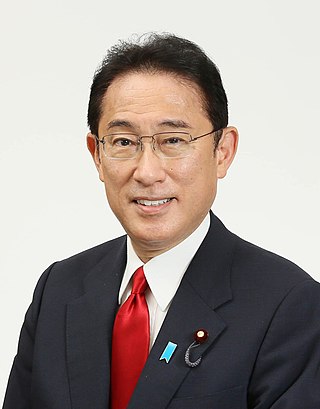
Fumio Kishida is a Japanese politician who has served as Prime Minister of Japan and President of the Liberal Democratic Party (LDP) since 2021. A member of the House of Representatives, he previously served as Minister for Foreign Affairs from 2012 to 2017 and as acting Minister of Defense in 2017. From 2017 to 2020, he also chaired the LDP Policy Research Council.

Yukihisa Fujita is a Japanese politician of the Constitutional Democratic Party, a member of the House of Councillors, the upper house of Japan's parliament, from the Ibaraki constituency. He is now the DPJ Next Vice Minister of Defense, the DPJ Next Vice Minister for the Abduction Issue, and the Director of Special Committee on North Korea Abduction Issue and Related Matter. He also is a member of Committee on Foreign Affairs and defense. He is a Former Senior Vice Minister of Finance. In the House of Councillors he is a former Chair of the Committee on Financial Affairs.[1] He also is a former Director-General of the DPJ's International Department and a former Chair of the House of Councillors' Special Committee on North Korean Abductions and Other Issues. Fujita is a native of Hitachi, Ibaraki and graduate of Keio University, Faculty of Letters.
Digital Hollywood University is a private university in Chiyoda, Tokyo, Japan. The predecessor of the school was founded in 1994, and it was chartered as a university on April 1, 2005 by Digital Hollywood Corporation, a school establishment corporation based on the Act on Special Districts for Structural Reform.
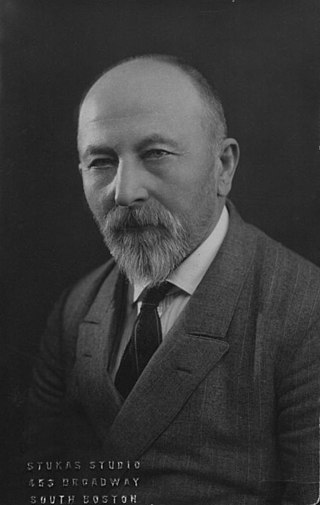
Martynas Jankus or Martin Jankus was a Prussian-Lithuanian printer, social activist and publisher in East Prussia, called the Patriarch of Lithuania Minor. He was one of the publishers of Aušra, the first Lithuanian-language newspaper for both Lithuania Minor and Lithuania Major. Jankus used various pen names, including V. Giedris, Martyneitis, Bitėnų Merčius, and Gyvoleitis.
Samuel Koranteng Pipim is a US-based Ghanaian author, speaker, and theologian. Trained in engineering and systematic theology, he based his office in Ann Arbor, Michigan, where, up until 2011, he ministered to students, faculty, and staff at the University of Michigan. He has authored and co-authored more than a dozen books. He has spoken around the world at events for youth, students, and young professionals. He helped begin and has sat on the board of directors for the Generation of Youth for Christ organization (GYC), a revival movement of Seventh-day Adventist youth in North America.
Google Play Books, formerly Google eBooks, is an ebook digital distribution service operated by Google, part of its Google Play product line. Users can purchase and download ebooks and audiobooks from Google Play, which offers over five million titles, with Google claiming it to be the "largest ebooks collection in the world". Books can be read on a dedicated Books section on the Google Play website, through the use of a mobile app available for Android and iOS, through the use of select e-readers that offer support for Adobe Digital Editions, through a web browser and reading via Google Home. Users may also upload up to 2,000 ebooks in the PDF or EPUB file formats. Google Play Books is available in 75 countries.

Yakov Lidski was a Warsaw-based Jewish bookseller and publisher, pioneer of Yiddish literature publishing. Founder of “Progress” publishing house, which was the first to publish modern Yiddish literature, and co-founder and owner of the important publishing syndicate “Central.”

The Museum of Antiquities in Vilnius was a museum of archaeology and history established by Count Eustachy Tyszkiewicz in 1855 at the premises of the closed Vilnius University. It was the first public museum in the former Grand Duchy of Lithuania and is considered a predecessor of the National Museum of Lithuania even though only a handful of items from the Museum of Antiquities ended up at the National Museum. Together with the Archaeological Commission which functioned as a de facto learned society, the museum was the most prominent cultural and scientific institution in all of Lithuania and displayed many historical items that reminded of the old Grand Duchy and served romantic nationalism of Lithuanian nobles at the time when Lithuania was part of the Russian Empire. The museum collections rapidly grew to over 67,000 items in 1865 by absorbing large collections of minerals and zoological specimens from the closed Vilnius University, libraries of various closed Catholic churches and monasteries, and various donations from local nobles.
The Garšviai Book Smuggling Society was an illegal society of Lithuanian book smugglers during the Lithuanian press ban enacted in 1864. It was one of the oldest book smuggler societies. Active from around 1883 to 1895, it was also one of the longest operating societies. It was based in at the home of Kazys Ūdra in the Garšviai village near Naujamiestis, Panevėžys. Led by Ūdra and Jurgis Bielinis, the society organized a network of trusted associates who would purchase the publications in East Prussia, smuggle them across the Prussia–Russia border, and distribute them in central Lithuania. In total, historian Antanas Tyla registered 54 people as members or collaborators. The society smuggled both books and periodicals, delivering them to subscribers, though they were particularly dangerous – they needed to be smuggled frequently and they were deemed to be anti-Tsarist political texts bringing much stricter sentences than smuggling of "innocent" texts with religious prayers or agricultural advice. For almost a decade, the society avoided more serious legal troubles. In February and April 1894, the society suffered financial losses due to confiscated property but managed to avoid a wider police investigation. In November 1894 and April 1895, two members of the society – Antanas Bružas and Andrius Bielinis – were arrested and sentenced to time in prison and exile, but the police did not uncover their connections to the Garšviai Society. The society unraveled when the police arrested Ūdra and found his notebook with names and addresses of his associates in June 1895. After a wide investigation, six men were put on trial while Jurgis Bielinis evaded capture. Ūdra and two others received two years in prison and five years in exile. Individual members of the society continued book smuggling, but the loss of the organized society disrupted the spread of the ideas of the Lithuanian National Revival in central Lithuania.
David Haddon Whitaker was a British book publisher. A direct descendant of Joseph Whitaker, he joined the family firm, J. Whitaker & Sons, in 1956. Whitaker became involved with the development of Standard Book Numbers, the precursor to the ISBN, in the 1960s. Whitaker's firm was well placed to drive the standard as it published records of all books published in the United Kingdom. The SBN was expanded internationally from 1968 and Whitaker, who is sometimes known as "the father of the ISBN", played a key role in this. He chaired the first International Organization for Standardization (ISO) working group on the ISBN and helped draft ISO standard 2108.